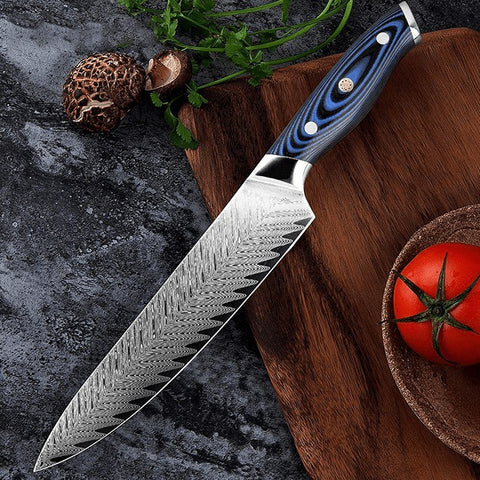The Ultimate Guide to Damascus Steel Chef Knives
A top-tier chef knows the value of having the right tools in the kitchen. One essential item is a Damascus steel knife. Known worldwide for its exceptional quality, this knife isn’t just functional—it’s a masterpiece. Combining ancient craftsmanship with modern engineering, it delivers both beauty and performance. This article will explore what makes these knives special, how to select the perfect one, and tips for maintaining them.

### What Is Damascus Steel?
Damascus steel is renowned for two primary qualities: its distinctive wavy patterns and remarkable strength. Originating in the Middle East, skilled blacksmiths crafted these blades by folding and forging layers of steel and iron. This process resulted in weapons that were not only harder and sharper than any other at the time but also more resilient.
Today, these knives are cherished not only for their functionality but also for their visual appeal. Modern Damascus steel imitates the intricate patterns and superior qualities of ancient models, ensuring that these knives perform flawlessly while looking like works of art. The swirling designs are not only aesthetically pleasing but also symbolize the durability and craftsmanship behind each blade.
### The History of Damascus Steel
The origins of Damascus steel date back to around 300 BC. Early craftsmen discovered that by repeatedly heating and folding layers of steel, they could create a material that was both hard and flexible. This innovation led to weapons that were far more durable than anything else available during ancient times.
Over centuries, the techniques evolved. Ancient blacksmiths relied on heating, folding, and hammering to create these masterpieces. Today, modern knife makers replicate these historic methods to produce knives that combine traditional beauty with contemporary standards of excellence.
### Characteristics of Damascus Steel
Damascus steel chef knives possess several unique traits that set them apart:
- **Durability:** The repeated folding process results in a blade that resists chipping and breaking, making it exceptionally tough.
- **Sharpness:** Compared to other knives, Damascus steel holds its edge longer, reducing the frequency of sharpening.
- **Aesthetic Appeal:** Each blade features a unique wave-like pattern, making every knife visually distinct and stunning.
### Types of Damascus Steel Chef Knives
Depending on your specific culinary needs, there are different types of Damascus steel knives available:
- **Kiritsuke Japanese Knife:** Ideal for precise cuts, especially when working with vegetables. Its design allows for thin slices and clean cuts.
- **Gyuto Japanese Knife:** Versatile and suitable for most cutting tasks, except for bones. This knife is perfect for all-around slicing.
For example, the **Kiritsuke Japanese Knife Damascus Steel with Colored Ebony Handle** is perfect for delicate cuts, while the **Gyuto Japanese Damascus Steel Knife with Colored Blue Handle** serves as a reliable all-purpose slicer.
### Blade Length and Handle Design
When choosing a Damascus steel knife, consider the blade length and handle design:
- **Blade Length:** Ranging from six to twelve inches, choose a length that feels comfortable and matches your cutting needs.
- **Handle Design:** Opt for handles that offer a secure grip and are ergonomic, such as those found on the **Kiritsuke Japanese Damascus Steel Chef Knife with Colored Octagonal Handle**.
### Maintaining Your Damascus Steel Chef Knife
Proper maintenance ensures your knife remains sharp and functional for years to come. Here are some tips:
- **Cleaning and Storage:** Always hand wash your knife with mild soap and warm water. Dry thoroughly to avoid rust and corrosion. Store in a knife block or on a magnetic strip to prevent accidental damage.
- **Sharpening and Honing:** Regularly hone the blade with a honing rod to keep it sharp. Sharpening should be done occasionally, depending on usage.
### FAQs
- **How Often Should I Sharpen My Damascus Steel Knife?**
For home cooks, sharpening every few months is sufficient. Professional chefs may need to sharpen more frequently due to heavy use.
- **Can I Put My Damascus Steel Knife in the Dishwasher?**
No, always hand wash to preserve the integrity of the blade and handle.
- **Are Damascus Steel Knives Worth the Investment?**
Absolutely. Their superior durability, sharpness, and aesthetic appeal make them a wise investment for serious cooks.
- **Can I Use a Damascus Steel Knife for All Types of Food?**
While versatile, these knives are best suited for tasks they are designed for, such as slicing and chopping, to maintain their edge and longevity.
### Conclusion
A Damascus steel chef’s knife is more than just a kitchen tool—it’s a blend of art and science. These knives are not only robust but also visually stunning, providing unparalleled service in the kitchen. By selecting the right blade and caring for it properly, you can enjoy its benefits for years to come.
Frozen Squid Semi-Finished Products
Squid Cut Flower,Squid Sashimi,Squid T+T,Squid T+R,Squid Wings,IQF Squid Products,Squid Semi-Finished Products
Zhejiang Industrial Group Co., Ltd. , https://www.xingyeseafood.com